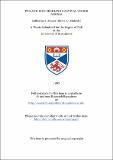Pea and rice seedling survival under anoxia
Abstract
It is not clear whether flood-tolerant plants survive in waterlogged soils because they maintain aerobic activity in all regions of the roots, or whether biochemical adaptations to anoxia are involved. Many plants have some capacity for internal ventilation, and so in order to exclude oxygen from the root environment it is necessary to subject both the roots and the shoots to anoxia. Pea and rice seedlings were exposed to anoxia for 1 to 24 h and their tolerances and survival compared. With pea and rice, cv. Oeiras, tolerance of anoxia decreased as the temperature increased, although rice was more tolerant than pea at a given temperature. Increasing amounts of K+ were lost from the roots of whole seedlings during anoxia, and seedling recovery on return to air was associated with the seedlings' ability to reabsorb most of the leaked K+. Aerobic respiration in the root tips was associated with both K+ uptake by pea seedlings, and the recovery and subsequent growth of pea and three varieties of rice after anoxia. All rice varieties were more tolerant of anoxia at 25°C than was pea at 20°C, but differences between the tolerance limits of the rice varieties were apparent. Although some pea and rice seedlings appeared undamaged after anoxia, the subsequent growth rates of pea and rice, cv. IR8, were seriously impaired. Ethanol accumulated around the roots of all seedlings during anoxia, but there was no correlation between the quantity of ethanol produced and the different tolerance limits of the seedlings. Pea seedlings that were prevented from transpiring during anoxia were damaged earlier than controls, possibly because of an increase in the rate of accumulation of a toxic product of anaerobic metabolism in these seedlings. Two percent glucose merely delayed, and did not prevent, the onset of damage in whole pea seedlings during anoxia, nor did it enhance the subsequent growth of the seedlings. Under these conditions, the accumulation of endogenous ethanol to a toxic concentration was considered to have been the more likely cause of seedling death. From the results presented in this thesis and elsewhere, it is concluded that-the immediate cause of seedling death during anoxia is a shortage of substrate for glycolysis, and that the additional effect of ethanol accumulation in some species may reduce their subsequent rate of recovery.
Type
Thesis, PhD Doctor of Philosophy
Collections
Items in the St Andrews Research Repository are protected by copyright, with all rights reserved, unless otherwise indicated.

